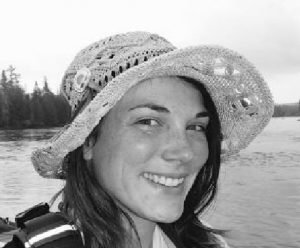Julia McGuire
 Julia McGuire is an EES student and UMaine black bear through and through, having earned both her B.S. in Ecology and Environmental Sciences in 2006 as well as her Ph.D. in 2016. Currently, she’s back on campus, having recently joined the UMaine faculty as a Lecturer in the School of Biology and Ecology in September.
Julia McGuire is an EES student and UMaine black bear through and through, having earned both her B.S. in Ecology and Environmental Sciences in 2006 as well as her Ph.D. in 2016. Currently, she’s back on campus, having recently joined the UMaine faculty as a Lecturer in the School of Biology and Ecology in September.
After earning her B.S. in EES (with a concentration in Resource and Environmental Policy) and a Spanish Minor, Julia pursued a diverse range of jobs starting with a consulting position with Abt Associates Inc. in Cambridge, MA, a global leader in research, evaluation and program implementation in the fields of health, social and environmental policy, and international development. During this time, Julia also began working on the Climate Change and Energy Use Commission in Somerville, MA. In 2008, Julia shifted gears and moved to Mexico for several months, where she put her Spanish language skills to work with El Charco del Ingenio, a local botanic garden, as well as PEASMA, an organization that provides science education to public and private elementary schools. Following her time in Mexico, she worked as a seasonal biologist for Maine Audubon and then worked at a non-profit tenant rights organization in Los Angeles as an environmental health educator focusing on healthy homes, including lead safe and integrated pest management education.
Julia returned to the University of Maine in 2011 as an EES doctoral student. She received an NSF Graduate Research Fellowship in 2012, and her dissertation research focused on the sustainability challenges facing Maine dairy farmers. Julia graduated in 2016, and began as a postdoctoral research associate with committee member, Dr. Jessica Leahy, in the UMaine School of Forest Resources. This work sought to understand differences between mill town and statewide perspectives of building biorefineries in Maine.
In September 2017, Julia completed her postdoctoral position and joined the UMaine faculty. In her new position, she teaches introductory biology courses (BIO 100, BIO 200, NFA 117), coordinates laboratory and TA pedagogy, and is leading an Honors tutorial focusing on engaged research in food systems. Throughout the various positions Julia has held since her undergraduate years, she credits the “diverse natural and social sciences requirements and classes such as BIO 205: Field Natural History of Maine [as] excellent preparation [for these positions].”
To learn more about what EES alumni are up to, follow us on Facebook and visit our Alumni page on the web.
